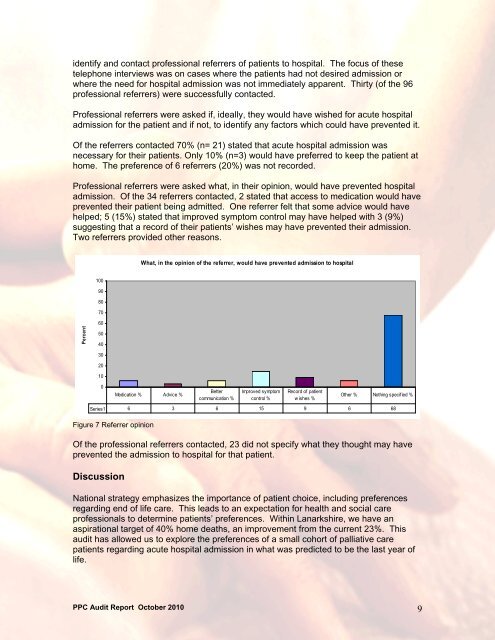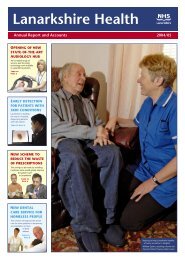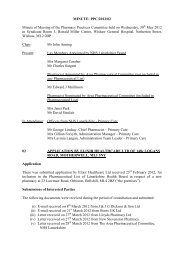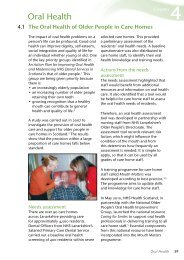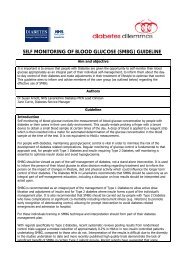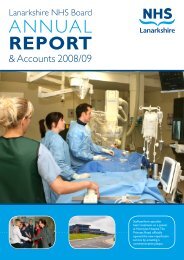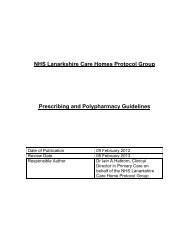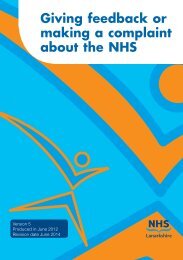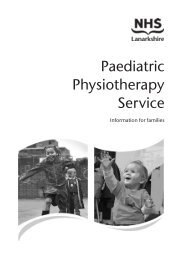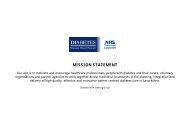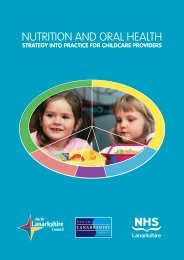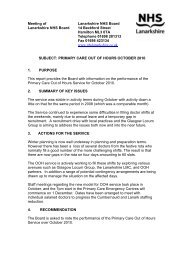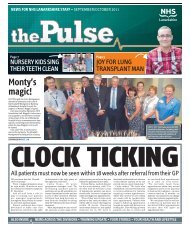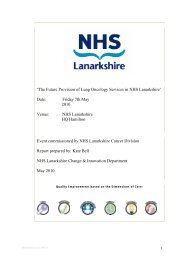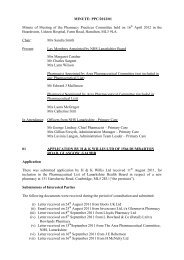Preferred Place of Care Palliative Care Audit ... - NHS Lanarkshire
Preferred Place of Care Palliative Care Audit ... - NHS Lanarkshire
Preferred Place of Care Palliative Care Audit ... - NHS Lanarkshire
You also want an ePaper? Increase the reach of your titles
YUMPU automatically turns print PDFs into web optimized ePapers that Google loves.
identify and contact pr<strong>of</strong>essional referrers <strong>of</strong> patients to hospital. The focus <strong>of</strong> these<br />
telephone interviews was on cases where the patients had not desired admission or<br />
where the need for hospital admission was not immediately apparent. Thirty (<strong>of</strong> the 96<br />
pr<strong>of</strong>essional referrers) were successfully contacted.<br />
Pr<strong>of</strong>essional referrers were asked if, ideally, they would have wished for acute hospital<br />
admission for the patient and if not, to identify any factors which could have prevented it.<br />
Of the referrers contacted 70% (n= 21) stated that acute hospital admission was<br />
necessary for their patients. Only 10% (n=3) would have preferred to keep the patient at<br />
home. The preference <strong>of</strong> 6 referrers (20%) was not recorded.<br />
Pr<strong>of</strong>essional referrers were asked what, in their opinion, would have prevented hospital<br />
admission. Of the 34 referrers contacted, 2 stated that access to medication would have<br />
prevented their patient being admitted. One referrer felt that some advice would have<br />
helped; 5 (15%) stated that improved symptom control may have helped with 3 (9%)<br />
suggesting that a record <strong>of</strong> their patients’ wishes may have prevented their admission.<br />
Two referrers provided other reasons.<br />
What, in the opinion <strong>of</strong> the referrer, would have prevented admission to hospital<br />
100<br />
90<br />
80<br />
70<br />
Percent<br />
60<br />
50<br />
40<br />
30<br />
20<br />
10<br />
0<br />
Medication % Advice %<br />
Series1 6 3 6 15 9 6 68<br />
Figure 7 Referrer opinion<br />
Better<br />
communication %<br />
Improved symptom<br />
control %<br />
Record <strong>of</strong> patient<br />
w ishes %<br />
Other % Nothing specified %<br />
Of the pr<strong>of</strong>essional referrers contacted, 23 did not specify what they thought may have<br />
prevented the admission to hospital for that patient.<br />
Discussion<br />
National strategy emphasizes the importance <strong>of</strong> patient choice, including preferences<br />
regarding end <strong>of</strong> life care. This leads to an expectation for health and social care<br />
pr<strong>of</strong>essionals to determine patients’ preferences. Within <strong>Lanarkshire</strong>, we have an<br />
aspirational target <strong>of</strong> 40% home deaths, an improvement from the current 23%. This<br />
audit has allowed us to explore the preferences <strong>of</strong> a small cohort <strong>of</strong> palliative care<br />
patients regarding acute hospital admission in what was predicted to be the last year <strong>of</strong><br />
life.<br />
PPC <strong>Audit</strong> Report October 2010 9


